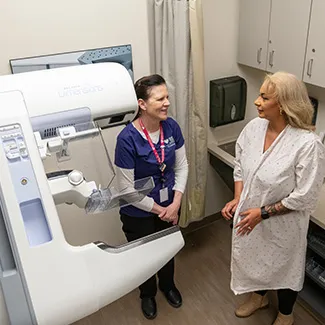June 11, 2025

By Randy Miles, MD
Mammography screening is the only imaging tool proven to reduce breast cancer related death. It helps doctors find breast cancer early — when it's easier to treat and before it spreads to other parts of the body. Despite the benefits of mammography, some patients may worry about radiation used with these imaging tests. Here is what you need to know.
Mammograms Use a Very Low Dose of Radiation
Mammograms use a very low dose of radiation to create images of the breast. Two mammographic views of each breast, which represents a typical exam, gives off about 0.4 millisieverts (mSv) of radiation. That is less than the radiation dose from a chest X-ray and about the same as what you'd be exposed to naturally from your environment over a two-to-three week period.
Benefits Far Outweigh Radiation Risks
The benefits of catching breast cancer early — when it's most treatable — are very real. Routine screening mammograms save lives.
3D Mammograms Provide a Clearer Picture
You should request a 3D mammogram, also called digital breast tomosynthesis, when you arrive at your breast imaging center for your mammogram. This study provides doctors a more detailed view of breast tissue, especially in women with dense breast tissue. The radiation dose of this exam is similar to standard 2D mammography, and it can help detect more cancers and reduce callbacks for additional imaging.
What About Other Breast Imaging Tests?
These are tests not associated with radiation exposure:
- Breast Ultrasound
- Breast Magnetic Resonance Imaging (MRI)
These tests do not replace a mammography when a mammogram is indicated, but they can be beneficial in diagnostic breast imaging based on prior imaging findings, patient symptoms, and/or family history.
Safety Comes First
All mammography equipment is closely monitored and regulated by agencies like the Food and Drug Administration and under laws like the Mammography Quality Standards Act. These rules make sure mammograms are safe, accurate and effective.
Summary
Mammograms are important in the early detection of breast cancer. The radiation dose used is minimal, and the benefits of early detection far outweigh not participating in routine screening. If you're due for a routine screening mammogram, schedule it today — it could save your life.

